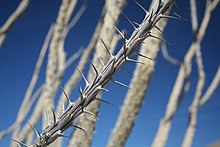owun
Ede Idaca
[edit]Etymology
[edit]Older form for the term salt mostly found in Eastern Yoruba varieties. See Igala ómu, Ifè oŋu, proposed to be derived from Proto-Yoruboid *ó-ɓũ. The form likely referred to an indigenous salt, perhaps related to rock salt or halite, which was later replaced by salt imported from the North. The existence of this term in Ede Idaca suggests that it existed in Proto-Yoruba and not just Proto-Edekiri, and also may suggest that the Ede group of languages (including Ede Ife and Idaca) split before the Northwest and Central Yoruba dialects split.
Pronunciation
[edit]Noun
[edit]owun
Gun
[edit]
Alternative forms
[edit]Etymology
[edit]From Proto-Gbe *-wũ. Cognates include Fon wùn
Pronunciation
[edit]Noun
[edit]owùn (plural owùn lɛ́ or owùn lẹ́)
Itsekiri
[edit]Etymology 1
[edit]Older form for the term salt mostly found in Eastern Yoruba varities. Cognates with Ede Idaca owun, Igala ómu, Ifè oŋu, proposed to be derived from Proto-Yoruboid *ó-ɓũ. The form likely referred to an indigenous salt, perhaps related to rock salt or halite, which was later replaced by salt imported from the North.
Pronunciation
[edit]Noun
[edit]owun
Etymology 2
[edit]Pronunciation
[edit]Verb
[edit]owun
- (transitive) to be (to have a quality or identification)
Usage notes
[edit]This verb cannot be used with regular subject pronouns such as mo or ó, and emphatic subject pronouns must be used in their place. This verb is also often used in a flipped structure where the quality or identification becomes the grammatical subject of the verb while an object pronoun is used for the actual subject of the sentence. The latter translated sentences better reflect the Itsekiri word order.
- Àghan dede owun mo kpè. – I am calling them. or It is them that I call.
- Ujó eyí wé nọ̀kàn owun ó ká jó – She/he only dances this dance. or It is this dance alone that she/he dances.
Etymology 3
[edit]Pronunciation
[edit]Noun
[edit]òwùn or owùn
Olukumi
[edit]Etymology
[edit]Compare with Igala ómu, Ifè oŋu, Ede Idaca owun, Northeast Yoruba oghun, proposed to be derived from Proto-Yoruboid *ó-ɓũ. Olukumi and Northeast Yoruba are the only descendants of Proto-Yoruba that retain this term
Pronunciation
[edit]Noun
[edit]ówún
Yoruba
[edit]Alternative forms
[edit]Etymology
[edit]Cognate with Yoruba òun, Igala òñwù
Pronunciation
[edit]Pronoun
[edit]òwun
See also
[edit]| Number | Person | Affirmative Subject Pronoun | Negative Subject Pronoun | Emphatic Pronoun | Possessive Pronoun | Object Pronoun | Possessive Determiner | Reflexive Pronoun |
|---|---|---|---|---|---|---|---|---|
| Singular | First | mo | mí | èmi | tèmi | mi | ara mi | |
| Second | wo | wé | ùwọ | tiẹ | ẹ | ara ẹ | ||
| Third | ó, é | [pronoun dropped] | òwun, òun | tiẹ̀ | ẹ̀ | ara ẹ̀ | ||
| Plural and Honorific | First | a | á | àwa | tẹni | ẹni | ara ẹni | |
| Second | wẹn | wẹ́n | ẹ̀wẹn | tiwẹn | wẹn | ara wẹn | ||
| Third | wọ́n | ọ̀wọn | tiwọn | wọn | ara wọn | |||
- Ede Idaca terms inherited from Proto-Yoruboid
- Ede Idaca terms derived from Proto-Yoruboid
- Ede Idaca terms with IPA pronunciation
- Ede Idaca lemmas
- Ede Idaca nouns
- Gun terms inherited from Proto-Gbe
- Gun terms derived from Proto-Gbe
- Gun terms with IPA pronunciation
- Gun lemmas
- Gun nouns
- Itsekiri terms inherited from Proto-Yoruboid
- Itsekiri terms derived from Proto-Yoruboid
- Itsekiri terms with IPA pronunciation
- Itsekiri lemmas
- Itsekiri nouns
- Itsekiri verbs
- Itsekiri transitive verbs
- Olukumi terms inherited from Proto-Yoruboid
- Olukumi terms derived from Proto-Yoruboid
- Olukumi terms with IPA pronunciation
- Olukumi lemmas
- Olukumi nouns
- ulb:Seasonings
- Yoruba terms with IPA pronunciation
- Yoruba lemmas
- Yoruba pronouns
- Ijẹbu Yoruba